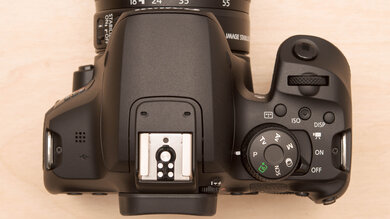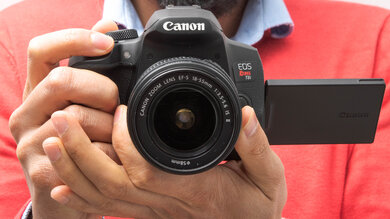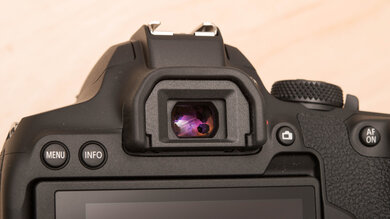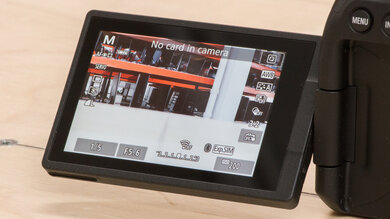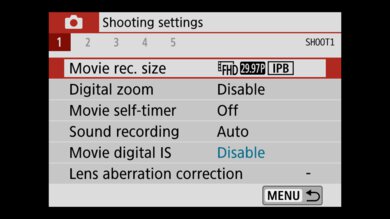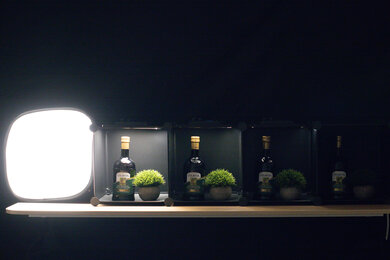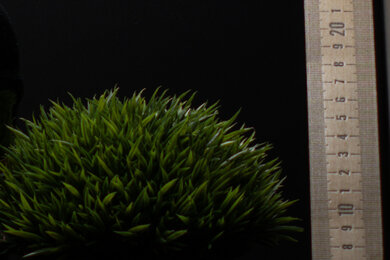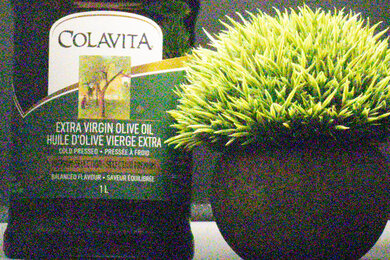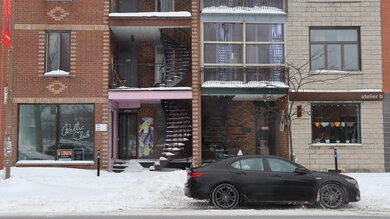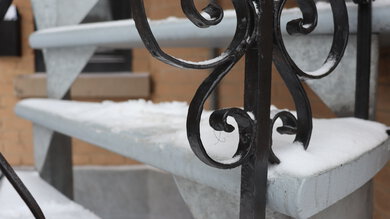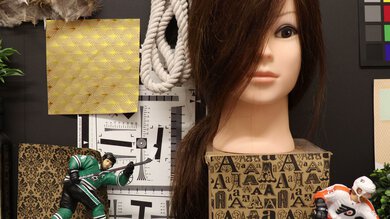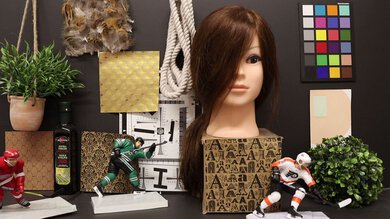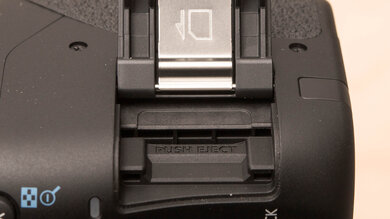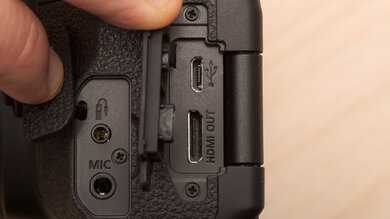The Canon EOS Rebel T8i/850D is a simple APS-C DSLR camera. It offers good overall image quality and has an autofocus system that does an exceptional job of tracking faces and objects during still photography. It's also quite comfortable to use and has a bright, fully articulated screen that's easy to see, even in direct sunlight. Unfortunately, it's quite bulky, and its video recording quality in both 4k and FHD isn't particularly impressive.
Our Verdict
The Canon T8i is decent for travel photography. Images are low in noise and graininess even at high ISO levels, and its autofocus system is quick, reliable, and consistent when accurately tracking moving objects and faces. The camera's minimum shutter speed also drops low enough for long exposure photography. Unfortunately, it's quite bulky and doesn't feel especially sturdy, though it is comfortable to operate.
-
Comfortable to use.
-
Good image quality for its class.
-
Good autofocus performance.
-
Bulky design.
-
Slightly plasticky build quality.
The Canon T8i is decent for landscape photography. Its overall image quality is good, though it doesn't perform too well in low light, with just okay noise handling. Still, it has good dynamic range for its class, so it's fairly well-suited to high-contrast landscapes. Its touchscreen interface is bright enough to be seen clearly even under direct sunlight and is quite sharp. Unfortunately, while the camera itself is comfortable to operate, it isn't especially easy to carry around for long periods, and the body isn't weather-sealed.
-
Comfortable to use.
-
Good image quality for its class.
-
Bright, sharp, fully-articulated screen.
-
Bulky design.
-
Slightly plasticky build quality.
The Canon T8i is okay for sports and wildlife photography. Its maximum continuous shooting speed isn't particularly high, which can make it difficult to capture distinct images of fast-moving subjects. Thankfully, the image quality itself is good, and you should be able to capture clear images that are mostly free of graininess, even at high ISO levels. The camera's autofocus system does an exceptional job of tracking moving subjects. Unfortunately, the camera's kit lens doesn't zoom sufficiently far enough to let you take pictures of far-away objects.
-
Comfortable to use.
-
Good image quality for its class.
-
Good autofocus performance.
-
Bulky design.
-
Low maximum shooting speed.
-
Slightly plasticky build quality.
The Canon EOS Rebel T8i captures decent RAW image quality. Its sensor has good dynamic range, so it preserves a fair amount of highlight and shadow detail. It also does a good job of resolving fine detail. However, its low-light noise handling is just okay.
-
Good dynamic range.
-
Noise handling is just okay.
The Canon T8i is passable for vlogging. It's quite bulky, which can make carrying it around a bit of a nuisance. Videos recorded in FHD and 4k also look somewhat noisy and grainy, and handheld footage can look shaky due to the camera's poor video stabilization performance. However, the camera's autofocus system does a fantastic job of tracking faces in FHD video, and the fully articulated screen can be fully rotated to let you see yourself when the camera is pointed at you.
-
Bright, sharp, fully-articulated screen.
-
Easy-to-use menu system.
-
Superb autofocus performance in FHD.
-
Poor autofocus performance in 4k.
-
Bulky design.
-
Poor overall video stabilization performance.
The Canon T8i isn't really intended for studio video. Video quality in FHD and 4k is sub-par, but the camera features a wide variety of inputs and outputs to let you attach a variety of accessories, from headphones and a mic to an external recorder. The camera's menu system is also quite easy to use. While autofocus performance in 4k is poor, it performs far better while recording FHD video.
-
Wide variety of inputs and outputs.
-
Easy-to-use menu system.
-
Superb autofocus performance in FHD.
-
Poor autofocus performance in 4k.
-
Sub-par overall video quality in FHD and 4k.
-
Limited selection of frame rate options.
The Canon EOS Rebel T8i isn't designed for action video. It's too big to be mounted on a helmet or chest rig and doesn't support any high-speed frame rate options in 4k or FHD for smooth, slow-motion video. Video stabilization performance is also middling overall.
-
Superb autofocus performance in FHD.
-
Bulky design.
-
Limited selection of frame rate options.
-
Poor overall video stabilization performance.
-
Slightly plasticky build quality.
- 7.4 Travel Photography
- 7.4 Landscape Photography
- 6.9 Sport & Wildlife Photography
- 7.3 Raw Photo Performance
- 7.0 Vlogging
- 6.9 Studio Video
- 2.9 Action Video
Changelog
- Updated Jul 10, 2024: We updated this camera's name from the 'Canon EOS Rebel T8i' to the 'Canon EOS Rebel T8i/850D' and added a note in the Differences Between Variants section about international naming variants.
- Updated Jan 29, 2024: Added text to the 'Raw Photo Performance' verdict box and updated other verdict boxes for clarity and accuracy.
- Updated Jan 29, 2024: Converted to Test Bench 0.12.1.
- Updated Apr 24, 2023: Converted to Test Bench 0.12.
- Updated Apr 17, 2023: Converted to Test Bench 0.11.
Check Price
Differences Between Sizes And Variants
The Canon Rebel T8i is only available in one color variant: 'Black,' and you can see its label here. We purchased the camera in a bundle with the Canon EF-S 18–55mm f/4–5.6 IS STM lens, but you can also buy it without a lens and buy EF or EF-S lenses separately.
Note that the Rebel T8i is also called the Canon EOS Kiss X10i in Japan and the Canon EOS 850D in other markets outside of North America.
Let us know if you come across a different variant so we can update our review.
Compared To Other Cameras
The Canon EOS Rebel T8i/850D and the Canon EOS Rebel SL3/250D are both great beginner DSLRs. The major difference is their design; the SL3 is more portable, while the T8i offers slightly better ergonomics and a better overall autofocus system. Otherwise, they're quite evenly matched and use similar sensors.
The Canon EOS 90D is better than the Canon EOS Rebel T8i/850D, which isn't surprising, as it sits at a higher price point. It's a better-built camera, with weather-sealing and slightly better ergonomics. It also has a higher-resolution sensor, faster burst shooting, and a longer battery life.
The Canon EOS Rebel T8i/850D is better overall than the Nikon D3500. It has a slightly more capable sensor, a faster max burst rate, and a more advanced autofocus system, along with extra features like 4k video capability and a fully articulated touchscreen. That said, the D3500 has a unique 'Guide Mode' to help new users grasp the basics of photography, meaning it may be preferable for absolute beginners.
The Canon EOS Rebel T8i/850D is better than the Canon EOS Rebel T7/2000D. Though both use 24 MP sensors, the T8i is newer, with a better processor, resulting in better overall image quality. It also has a more advanced and effective autofocus system, along with extra features like a vari-angle touchscreen and 4k video capability.
Test Results
- Rubber eyecup around the viewfinder feels comfortable and well-padded
- Hand grip should accommodate a wide variety of hand sizes, without fingers getting pinched between the body and lens
- Hand grip has a textured surface that provides a secure hold
- Changing ISO is simple due to the dedicated ISO button
- Camera features a toggle switch to change from photo to video mode
Comments
Canon EOS Rebel T8i/850D: Main Discussion
Let us know why you want us to review the product here, or encourage others to vote for this product.
Update: We updated this camera’s name from the ‘Canon EOS Rebel T8i’ to the ‘Canon EOS Rebel T8i/850D’ and added a note in the Differences Between Variants section about international naming variants.




